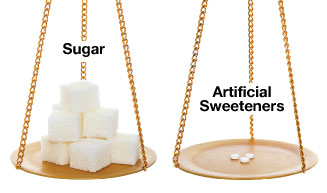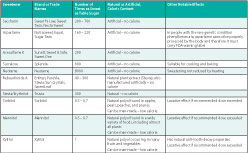Artificial Sweeteners
Satisfying and Protecting Your Sweet Tooth
(Continued)
The Controversy: Are Sweeteners As Safe As They Seem?
On the other side of the argument, however, are those who claim that low-calorie and artificial sweeteners do more harm than good and should be viewed with greater scrutiny. The FDA has established acceptable daily intake levels for artificial sweeteners, which average consumption levels likely fall well below (for instance, reaching the level set for aspartame would be equivalent to drinking twenty regular-size cans of diet soft drinks daily). For low-calorie sweeteners, excessive consumption (in the range of 20-50 grams per day) can cause upset stomach and diarrhea.
In the 1970s, saccharin in particular fell out of favor and was nearly banned following reports linking its consumption to bladder cancer in rats. It has since been established that there is no elevated bladder cancer risk in humans, and the FDA, US Environmental Protection Agency, and National Cancer Institute have removed it from lists of potentially harmful agents. Consumer advocates continue to call for more safety data on regular consumption of artificial sweeteners, particularly newer entries to the market such as neotame, sucralose, and rebaudioside A/stevia.
 |
| Artificial sweeteners are hundreds to thousands of times sweeter than table sugar while adding negligible calories to your diet. |
Current controversy centers largely on how artificial sweeteners affect taste perception, metabolism, and overeating. While widely touted as a potential factor in combating the United States' obesity epidemic, artificial sweeteners have also become a target. A 2008 study showed that rats fed saccharin ate a greater quantity and gained more weight than those who didn't receive artificial sweetener. Although the study was small and conducted in animals, it raised several questions about how artificial sweeteners drive eating behavior. Researchers speculated that sweeteners may actually increase hunger by stimulating responses to sweet tastes without providing nutrition. High-intensity sweetness may also decrease sensitivity to sweet flavors, driving eaters to seek more and more.
A study comparing brain activity of women who consumed sucralose to that of women who consumed sugar, showed that both substances activated regions of the brain associated with taste, but sugar activated brain regions related to satisfaction more strongly. Potentially, the body can recognize a difference between sugar and artificial sweeteners, so that simply providing a sweet taste may not fulfill the brain's expectations and reward pathways.
 |
| A Closer Look at Sugar Substitutes Click to enlarge |
Critics of artificial sweeteners also point to a 2008 epidemiological study in Circulation that associated drinking one can of diet soda daily with a 34% increased occurrence of metabolic syndrome — a combination of medical disorders that significantly increases risk of cardiovascular disease and diabetes — compared to those who did not drink any soda products. Regular soda drinkers had an associated risk only 10% higher than non-soda drinkers.
What To Put In Your Shopping Cart — And Your Mouth
So in light of all this information, what should the average consumer do? It's clear that artificial sweeteners are here to stay and will continue to be found in products ranging from the medicine cabinet to the kitchen pantry. It's also true that questions surrounding sweeteners, and answers both factual and fictitious, will continue to circulate.
Currently, there are no FDA or government guidelines against the use of artificial sweeteners and strong evidence for their use in preventing tooth decay. They can be an important tool in helping to combat overeating, which in turn promotes improved health through maintaining a healthy weight and lowering risk of diet-related diseases like heart disease and diabetes. Looking for artificially sweetened versions of products like chewing gums, flavored beverages, candies, or yogurts can help cut down calories without feelings of deprivation. In moderation, artificial sweeteners can satisfy the taste buds without compromising dental health or adding too many calories, and can be part of an overall healthy lifestyle.



